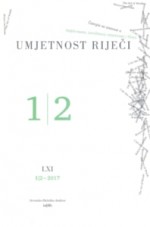Miroslav Krleža i povijest hrvatskoga razvlaštenja
MIROSLAV KRLEŽA AND THE CROATIAN NARRATIVE OF
DISPOSSESSION
Author(s): Vladimir BitiSubject(s): Language and Literature Studies, Croatian Literature, Nationalism Studies
Published by: Hrvatsko filološko društvo
Keywords: Croatian national question; sovereignty; dispossession; victimhood;
Summary/Abstract: Due to Miroslav Krleža’s resolutely Yugoslav and leftist orientation after the Se¬cond World War, his long-term interwar obsession with the “perennial” national dispossession of the Croats has been rarely noticed. On the basis of a systematically mournful portrayal of both Croatia’s historical fate and its present condition, Krleža raises a “masculine” imperative of a violent and final liberation from oppressors in both his fiction and essays. To legitimise this revolutionary utopia, he draws nu¬merous analogies between the Croatian present, early nineteenth century, and the Middle Ages, i.e. the epochs marked by completely different political and ethnic status for “Croatianness”. Simultaneously, however, Krleža repeatedly cautions of the necessity of carefully establishing historical differences between these epochs. Moreover, his argument persistently oscillates between the national and the social platform of collective liberation, employing a characteristically tacit transformation of class characteristics into national ones. He switches from one to the other in a passionate attachment to the radical ideal of self-determination, which with the Ver¬sailles Treaty was transposed from the well-established Western European nation states onto the fractured political space of East Central Europe, with devastating consequences. It ignited compensatory populist ideologies and dreams of sovereignty by presenting the new states’ pauperised and exhausted masses with the prospect of ultimate salvation from their precarious social and economic situation. Krleža proved a fanatical advocate of such starkly counterfactual projects. For him, as a writer from the East Central European political and intellectual sphere, politics was a prophetic vision rather than a cold-blooded business driven by various pragmatic interests in Western Europe.
Journal: Umjetnost riječi
- Issue Year: 2017
- Issue No: 1-2
- Page Range: 1-26
- Page Count: 26
- Language: Croatian

